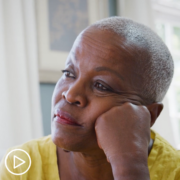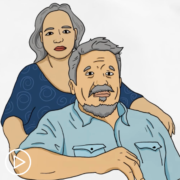A Multiple Myeloma Advocate’s Uphill Battle to Care
A Multiple Myeloma Advocate’s Uphill Battle to Care from Patient Empowerment Network on Vimeo.
Diahanna Vallentine of Louisville, Kentucky shares how advocating for her late husband of 28 years following his myeloma diagnosis “felt like an uphill battle.” As any care partner in this position, Diahanna’s multiple myeloma research uncovered more questions than answers. When she sought clarity from her husband’s care team, she was met with hostility. The toll of emotional and financial toxicity ate into their life savings. Following her husband’s passing, Diahanna has made it her life’s mission to help other patients and families facing a multiple myeloma diagnosis avoid inequitable roadblocks to care.
Diahanna’s advice,“Find your voice, talk to your doctor and feel empowered to question your care team. These actions are key to staying on your path to empowerment.”
See More From the Diverse Partners in Your Myeloma Care Program
Related Video:
How Can I Get the Best Multiple Myeloma Care No Matter Where I Live
Transcript:
My name is Diahanna, I’m from Louisville, Kentucky. My husband of 28 years was diagnosed with Multiple Myeloma in 2005 after a prior misdiagnosis and treatment. My family and I were devastated. Prior to his diagnosis, we were busy with two sons in high school, he was working and coaching and I was starting up my own investment firm. Following the myeloma diagnosis, I became my husband’s advocate and caregiver. As his myeloma progressed, our path to empowerment didn’t come without trials and tribulations.
In the hospitals, I found other families overwhelmed by emotional and financial toxicities. Advocating for my husband felt like an uphill battle. While he was on life support, his doctors wanted to do an experimental treatment and I asked “What was the experiment?
And what were the outcomes of the experiment?” The doctor got six inches from my face and said, “You don’t have the right to ask questions, we’ll normally do this and you’ll find out about it later.”
This was very disparaging. The hospital had signs indicating the importance of family involvement in treatment for better health outcomes. What was it about my situation that did not allow me to have the same opportunity?
I soon realized it had nothing to do with my education, or economic background, it was a matter of stereotypes and unconscious bias. And as a result, many suggested treatments were not in my husband’s best interest, or our family’s financial best interest. We soon found ourselves using our life savings.
Since the passing of my husband, I’ve made it my mission to help others facing the same challenges we did.
I want to let patients, caregivers and families facing a multiple myeloma diagnosis know there is hope. Don’t give up. There are resources available to you. Find your voice, talk to your doctors. Be strong. Feel empowered to question your care team, and find out what the cost of care is going to be from the outset.
These actions are key to staying on your path to empowerment.
Everyone should be able to get the best myeloma care no matter where they live.










